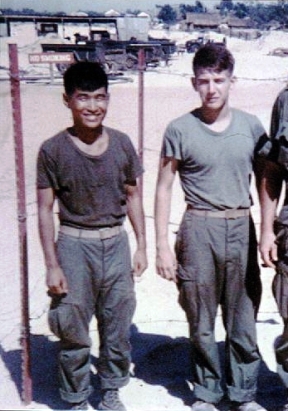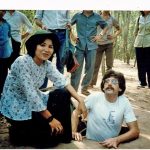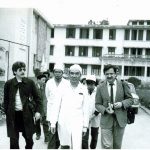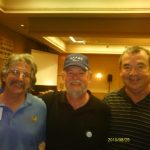What do you call a poet who’s been struck by lightning a dozen times? W.D. Ehrhart. But each time a current courses through his body, the result is a work of great literary power. Take a quick moment through Ehrhart’s zigzagging writing career, as narrated by Dan Duffy, in a post originally published on vietnamlit.org.

Robert Graves observed that to write a real poem is like getting struck by lightning. If it happens six or a dozen times we aren’t going to stop talking about you.
W.D. Ehrhart is a lightning rod. We printed one of his real poems on Constitution Day.

Here is another one and another and one more. People aren’t going to stop talking about Bill.
His work is the focus of the study of literature from the American soldiers in Viet Nam that reaches the most general conclusions and speaks to those furthest outside the field. Kali Tal devotes a chapter of Worlds of Hurt: Reading the Literature of Trauma to Bill’s work.

In the print edition she concluded that a man who won’t shut up about what war is like for infantry and those civilians in their way is not going to fit into society. Kali was speaking from her own predicament.
Bill had in fact been offered a career screaming at young men about war as a Marine drill instructor. Instead he became a poet.

When Graves spoke of lightning he was making the practical observation that you can’t write real poems nine to five for a career. Graves himself, soldier-poet of the Great War, instead wrote a best-selling memoir and removed to Majorca from where he issued an historical novel every year or so.
Bill wrote three memoirs which take the reader, especially a young man with notions of military service, from small-town America to killing an old man and a child in Viet Nam, resisting the war at home, and riding around in a Volkswagen with dead teen-age friends in the back seat who want to call on Richard Nixon. All three books sell steadily.
[amazon_enhanced asin=”0870239570″ /][amazon_enhanced asin=”0870239589″ /][amazon_enhanced asin=”0870239554″ /]

He became a high school teacher, like Simone de Beauvoir and Jean-Paul Sartre. He set to work as a scholar, achieving publications that would fit in at a research university or make him the star of a liberal arts college.
He edited a standard collection of American poets of the war in Viet Nam. He tracked down the men he entered the Marines with and reported on their lives.

He moved on or back to our war in Korea and edited a collection of poems and stories from the Americans who fought there. He earned his doctorate from the University of Wales with a dissertation on that work.
Collections of poems and essays appear regularly. He has loyal and effective publishers at Adastra and at McFarland.

Lightning still strikes.
For entree to his oeuvre, what you call it when a poet writes prose and conducts research, see the W.D. Ehrhart website. For a sense of his life scroll through the photos on this post.

They start with one of him and Ken Takenaga in the Marines in Viet Nam. The two men were later wounded by the same rocket-propelled grenade at the battle for Hue City.
The last photo is from Ken & Bill’s Excellent Adventure when the two journeyed back to the house where they were blown up. Read about their trip not just to Viet Nam but to Ken’s native Japan.

In between are happy shots from the active life of a lucky poet. W.D. Ehrhart has been hit by lightning many times and is burning to warm us all.
– Dan Duffy, Editor of Viet Nam Literature Project, where this post first appeared
Please take the time to rate this post (above) and share it (below). Ratings for top posts are listed on the sidebar. Sharing (on email, Facebook, etc.) helps spread the word about diaCRITICS. And join the conversation and leave a comment! Have you read any of Ehrhart’s work? What other works from soldiers have you come across?


